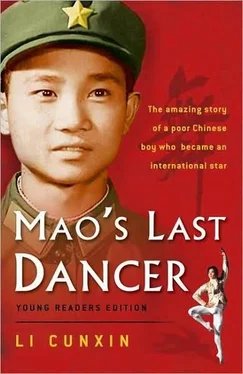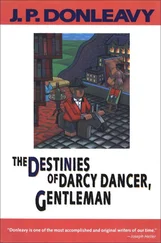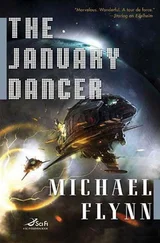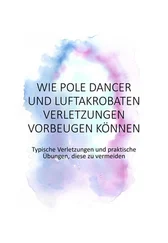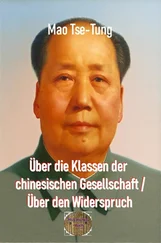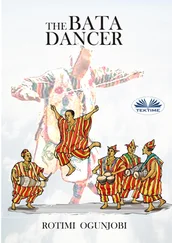It was mid June and a very hot day. Everyone was busy decorating my parents' house for the wedding. Many different shapes and colours of double happiness papers were glued onto the walls, the doors and the windows. Even the chests of drawers were covered with them. Now, instead of using sedan chairs for the bride and groom, my family had hired two cars and decorated them with big red silk flowers and ribbons.
Around eleven o'clock the wedding cars slowly rolled into our narrow street. Cunsang and Cunfar immediately lit up long strings of firecrackers. I was the official photographer, with a video camera in one hand and a stills camera in the other. The groom helped his beautiful bride out of the first car. She was dressed like a Western bride in a long white dress with a lot of frills and a floral veil. She even wore high-heeled shoes. My little brother wore a cream suit with a red silk rose pinned over his heart. A huge crowd of people gathered around and everyone murmured lucky words: "Handsome dragon attracts beautiful pheasant," "Arrival of daughter with many sons to follow," they would say. In this wedding there would be no kowtowing in front of a fire, no stepping over a horse's saddle, no three-day sitting for the bride. But the bride and groom did get a bowl of "widen your heart" noodles and the dates and chestnuts were still tied to their chopsticks, just as they were for my parents so many years before.
The two refrigerators that Mary and I had sent on ahead for my family still hadn't arrived, so there was nowhere to keep the food cool on the wedding day. Everything had to be bought and cooked fresh. Cunmao and Cunfar were the designated chefs and Cunsang was the kitchen hand. Both lunch and dinner receptions were held in my parents' house. The courtyard was crammed with tables and chairs: fifty guests, five tables of ten, and my brothers did all the cooking on one coal burner. Endless dishes were served. It was a feast. And since Mary and I hadn't had our wedding in China, everyone insisted that Mary too should dress up like a bride. Somewhere they found her a Western wedding dress. It was pink and she looked beautiful.
To say everyone had a merry time that day was an understatement. Many of the old traditions might have gone, but excessive drinking was one they'd certainly kept. Guests were falling on their faces from over-drinking. Some of the new traditions helped here, like trying to pick up hard-boiled eggs from a flat plate with a pair of chopsticks. Mary and I, and the bride and groom, had to walk around carrying trays laden with glasses of wine to give to each guest as lucky drinks. Before each of them could take one, they had to say something lucky to us, such as "wishing you a happy life with many sons" or "love each other until the silver beard touches the ground". They were not allowed to repeat other people's lucky wishes or more penalty drinks would be awarded. Trouble was, the more they drank the more likely they were to forget what others had said before. And so it went on.
Suddenly, in the middle of the drinking binge, my big uncle, my niang's eldest brother who was head of the propaganda department for the Qingdao Building Materials Bureau, made a request and everyone cheered him on. He wanted Mary and me to dance. We happily agreed and decided to dance one of our favourites, the second act pas de deux from Giselle. We'd had a few drinks too, but it didn't matter. We just hummed the music and danced while our adoring audience clapped and cheered our every lift and movement. It was one of our most rewarding performances ever.
After our dance, our dia spoke as the father of the groom. I'd had no idea this was part of the new custom. "Welcome, dear relatives and friends," he said. "This is one of the happiest days for the Li family. As you all know, I don't talk much. My wife always takes the words out of my mouth."
His audience laughed and our dia looked over at our niang on the ladies' table. She gave him a happy, loving smile.
Our dia continued. "When I was twenty-one years old, my niang told me that I was to marry a nice girl aged eighteen. I told her, `I don't want to marry anyone, I don't know how to be a husband.` She replied, "All you have to do is love her. She will teach you the rest about life." Little did I know then, but by fate I had married a rare jewel, the most precious jewel I could ever wish for. I treasured and loved her from the time I lifted her veil. I still love her today and will love her for the remainder of my humble life. My niang was right. My wife took care of everything. She taught me everything I needed to know. She made me a better man." He paused. "We have been through tough times together. Sometimes we felt like we couldn't go on, but then some sparks of life reminded us why we should go on. These sparks gave us such pleasure. These sparks are our children. We are fortunate…" Our dia hesitated. He was finding it hard to speak. "We are fortunate to have seven sons," he said, holding back tears. He looked at his fourth brother. They held hands and my dia continued. "We are proud of each and every one of our sons. The fact that you are all still alive today is such a miracle. Each one of you is so fortunate to have survived through those harsh years and now all of you have married nice wives and four of you have your own beautiful children. All I want to say to you today is… love and treasure your wife and children with all your hearts. It doesn't matter what happens in the world around you. As long as you have your family, everything will be all right."
There was silence. I had never heard him speak so much, so eloquently. I quietly went over to the ladies' table and told Mary what the man of few words had just said.
Mary got up. She walked over to our dia and kissed him on his cheek. She raised her wine glass and shouted in her best Shandong dialect, "To Dia, to Niang! Gan bei!"
Everyone stood and raised their glasses high. "Gan bei!" they roared in response. This was the last thing they'd expected from a Western girl.
There were only a few days left now before Mary and I were due to leave Qingdao. Yang Ping, the boy whose arm I'd broken when we were only nine years old, had organised a class reunion in my honour. Over thirty of my old classmates were there. Many childhood stories were retold, some happy, many sad. Teacher Song was there too. She immediately recalled the moment she pointed me out to the auditioning teacher from the Beijing Dance Academy. "Strange how things happen," she said. "I wondered so many times what your life would have been like if I hadn't tapped on that person's shoulder that day. You know, I so very nearly didn't."
Three days before our flight back to Beijing and America, I sat by my niang's side on the kang, watching her sewing furiously. She was making a cotton quilt for Mary and me. We'd told her that there was no more room in our suitcases for a quilt. But, she'd said, to give newlyweds a quilt was a Chinese tradition, and she'd wanted to make me another ever since I'd told her that the officials of the Beijing Dance Academy had burnt my precious quilt. "Jing Hao, I know, for all these years, how much guilt you must have felt for having more than your brothers, how much responsibility you must have felt carrying your entire family's dreams on your shoulders, how much burden you must have put on yourself by realising that you had to succeed. I also know how much you loved your family and how much you wanted to help us. Now you've seen how well your brothers are doing, you should let go of all your worries. You have given all of us so much already. The one thing your brothers will always treasure is what you've done with your life. Your success has given them hope, courage, pride. It will be their inspiration to move forwards. You have no idea how proud of you we all are!" Just then I noticed Mary walk in with my youngest sister-in-law, but when she saw my niang and I engaged in such an intimate conversation she quickly led my sister-in-law out.
Читать дальше
